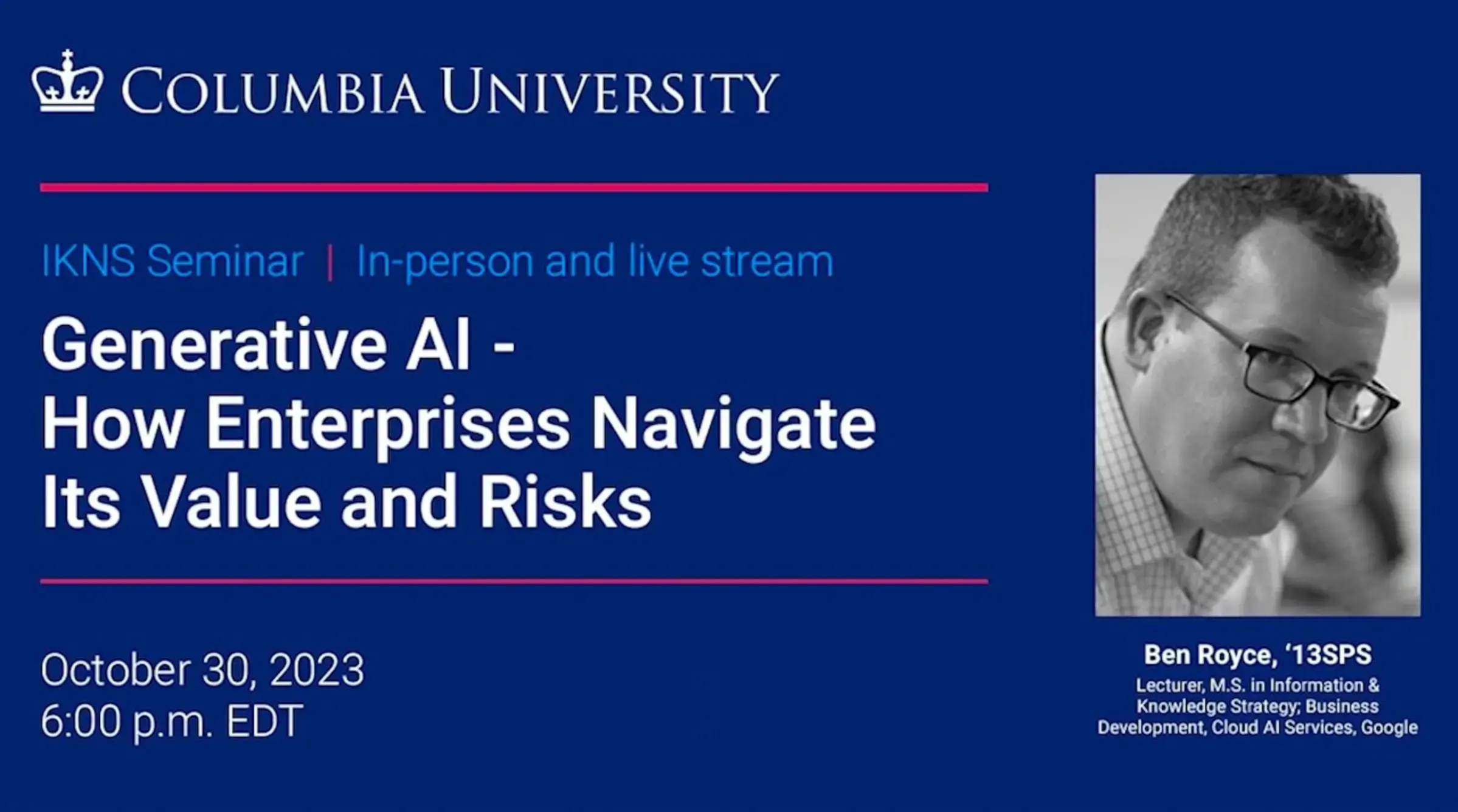There’s good news and bad news for people concerned about competing with artificial intelligence in the job market. The good news is that those who learn how to use the tool won’t be threatened by it. The bad news: Those who don’t, might.
That’s according to Ben Royce (’13SPS, Information & Knowledge Strategy), AI Services manager for Google Cloud and lecturer on artificial intelligence at Columbia SPS. Royce spoke in an Information & Knowledge Strategy (IKNS) seminar on October 30 about current concerns regarding artificial intelligence in the workplace and what the future might hold.
“If your job involves documents, this is relevant to you,” Royce said. “I don’t think we’ve been able to say something is that widely applicable since [the invention of] the internet.”
People are “getting very nervous” about Generative AI, he allowed. “But the fact is that the most creative people are having a field day with this all in the right ways. If you have good thoughts, generative AI just became your best friend.”
The companies that thrive as AI grows in prominence will be the ones that embrace it and find creative ways to use it, Royce said.
“A lot of people talk about savings, and they talk about how this is going to save time, it’s going to save money, it’s going to save royalties on stock photography or something like that,” he said. “Sure. I think that’s valid. But most people’s careers don’t get made on saving money. They get made on generating revenue, for the most part.”
Businesses should give employees the room to experiment and let them guide the firm into ways of coexisting with, and profiting from, AI, according to Royce.
“Give them the sandbox, give them the room to play with this technology,” he said. “So one, they do it on the grid; two, they do it in a safe manner because they’re going to do it anyway; and three, watch how they use it.”
Ultimately, it’s the people in the sandbox who will prosper.
“Generative AI will probably not take your job,” Royce said. “I don’t think that will happen. Someone using generative AI might, though. That freaks people out a little bit, right? So my suggestion is, try it.”
The question-and-answer portion of the event covered topics about China, environmental impact, and other possible dangers. One audience member asked if Royce could give an example of why or when AI shouldn’t be used.
“The more you learn about this technology, the less the scary stuff has weight,” Royce said. “But I have noticed an ugly trend that I don’t think people are talking about enough. Governments are starting to release data that is suspiciously friendly to their regime, ... hoping that it gets picked up [by systems like ChatGPT]. It’s modern propaganda. So I think the data sources are important.”
Columbia’s IKNS program convenes expert seminars like these once or twice a semester. They are open to industry professionals, students, alums, and faculty to promote debate and intellectual exchange at Columbia University and beyond. As Royce is an alum, lecturer, and thought leader at Google all at once, the seminar was well-attended, according to Michael Karbowiak, associate director of Administration in IKNS; approximately 200 people attended the event, which included a question-and-answer section, a reception, and a book raffle.
“Generative AI is an important topic, as it is revolutionizing the way people work, and yet we have still only scratched the surface of how it can be applied within organizations,” Karbowiak said. “Ben Royce is an expert on the topic, designing AI solutions for Google Cloud customers by day and teaching AI and the Knowledge-Driven Organization to IKNS students at night.”
Christoph Meinrenken, Ph.D., IKNS program director, commented on Royce’s ability to connect with such a mixed audience.
“Looking around the room and listening to the questions during the Q&A, it was apparent that attendees ran the gamut from only just learning about Generative AI, to actively using it in their job, to being veteran experts,” Dr. Meinrenken said. “Especially in such a fast-evolving field, it was great to see how adept our faculty member Ben was at addressing these questions at all levels.”
About the Program
The Columbia University M.S. in Information & Knowledge Strategy (IKNS) program provides students with foundations in information science, organizational psychology, and change management as well as practical skills in project management and executive leadership.
Watch the full event below:



